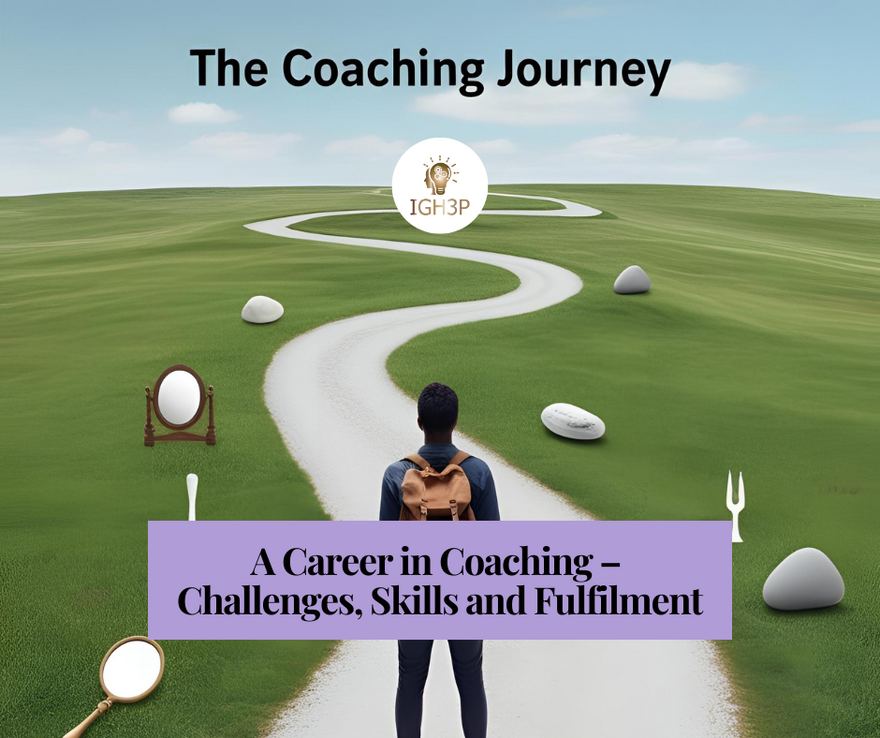A Career in Coaching – Challenges, Skills and Fulfilment

A Career in Coaching – Challenges, Skills and Fulfilment
Coaching has become one of the most dynamic and transformative fields in the helping professions. Increasingly integrated into business, education, health, and personal development contexts, coaching offers individuals the opportunity to create change, realise goals, and deepen self-awareness. For those considering a career in coaching, it is both a deeply fulfilling and intellectually demanding path. However, to thrive, one must understand not only the rewards but also the challenges and responsibilities that come with the role.
At its core, coaching is a collaborative, non-directive process that facilitates a client’s growth through structured conversations and reflective inquiry. Unlike teaching or advising, coaching does not seek to transfer knowledge or offer solutions. Instead, it invites the client to tap into their own resourcefulness, exploring new perspectives and unlocking potential. This means that effective coaching depends less on technical expertise and more on the ability to create presence, build trust, and listen without judgement.
The essential skills of a coach include active listening, powerful questioning, emotional regulation, and the ability to challenge constructively. These skills must be practised and refined over time, often through supervision, peer feedback, and professional training. Coaches must also understand the importance of contracting, confidentiality, and boundaries—especially when working with clients who may present complex emotional issues. While coaching is not therapy, it often requires the sensitivity to know when to refer a client for more specialised support.
One of the most significant challenges for new coaches is navigating the early phase of professional identity. Many aspiring practitioners wrestle with imposter syndrome, uncertainty around niche selection, or difficulty attracting clients. These hurdles can be disheartening without the right support network.
This is why affiliation with a professional body such as the International Guild of Hypnotherapy, NLP and 3 Principles Practitioners and Trainers (IGH3P) can be a vital part of a coach’s journey. IGH3P offers not only training and ethical guidelines but also mentorship, community engagement, and continuous professional development—essential resources for coaches committed to excellence and integrity.
Another challenge lies in the emotional demands of coaching. Holding space for clients who are navigating difficult emotions, life transitions, or internal conflict requires the coach to be self-aware, resilient, and grounded. Self-care, reflective practice, and ongoing learning are not optional—they are central to sustainable coaching practice. Moreover, coaches must remain attuned to diversity, power dynamics, and cultural sensitivity, especially when working across different communities or contexts.
Despite these challenges, the rewards of a coaching career are considerable. Coaches witness real change, often in short timeframes. They help clients gain confidence, clarify purpose, and step into greater agency in their personal and professional lives. This sense of contribution and empowerment can be profoundly fulfilling. Furthermore, coaching offers flexibility—whether in private practice, within organisations, or alongside other modalities like hypnotherapy or NLP.
For practitioners aligned with humanistic and integrative values, IGH3P offers a community that honours both the science and the soul of coaching. It encourages coaches to develop not only technical proficiency but also a compassionate presence rooted in holistic understanding.
In conclusion, a career in coaching is not a simple undertaking—it demands dedication, courage, and humility. Yet for those willing to engage with its challenges, it offers a meaningful vocation with the power to change lives—starting with your own.

0 comments
Leave a comment
Please log in or register to post a comment